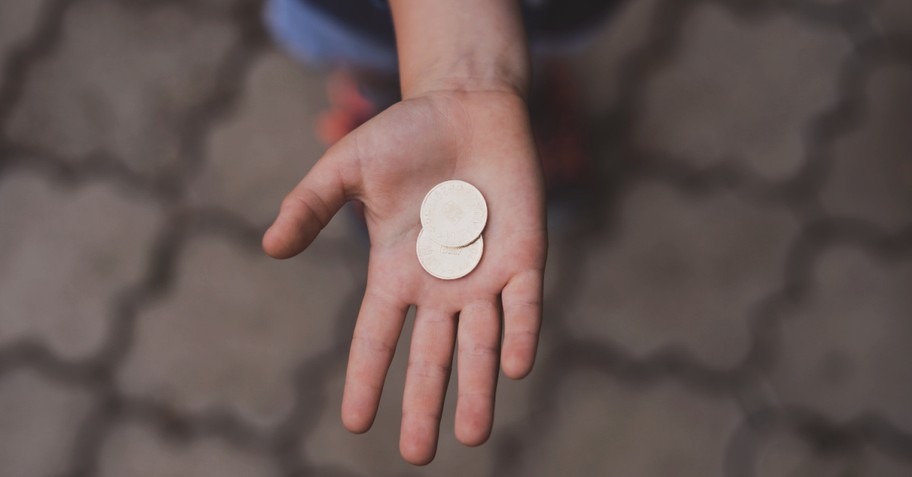As we approach the season of Thanksgiving, reminders about gratitude and thankfulness are becoming more evident in stores and in conversation. “Be grateful,” reads a rustic-looking sign in a shop window. Meanwhile, people post pictures online of things like a “gratitude pumpkin,” upon which they write short messages of things for which they are grateful and keep on display as a centerpiece for all to see.
But gratitude isn’t only related to one season a year. Looking to the Bible, we see thankfulness expressed and appreciated from start to finish. And in Jesus’s earthly ministry, we find a number of examples of ways he and his disciples expressed thanksgiving.
Here are seven key things Jesus and his disciples taught us about gratefulness and giving thanks.
Photo credit: ©Getty Images/Tonktiti

1. Jesus Taught about Gratitude for Daily Needs, Like Food
As part man, part God, Jesus is our perfect example of how to live. As the apostle John said, in Jesus, “Word became flesh” (John 1:14). Our Lord came to earth to show us the way to heaven. Indeed, Jesus himself told his followers, “I am the way and the truth and the life. No one comes to the father except through me” (John 14:6).
As a man, Jesus was a Jew and knew well the traditions of expressing gratitude for all blessings given by God, large or small. And Jesus modeled this for us throughout the gospels, thanking the Father at mealtimes.
In Matthew 14, when a huge crowd gathered in a remote location to hear him teach, they grew hungry. All that could be found were five loaves of bread and two fish, but Jesus was grateful for this. As Scripture tells us, Jesus looked up to heaven, then “Gave thanks and broke the loaves. Then he gave them to the disciples, and the disciples gave them to the people” (Matthew 14:19). The meager amount ended up being one of the miracles in Jesus’s ministry, feeding 5,000 people with 12 basketfuls left over.
At the Last Supper, before his betrayal and crucifixion – the Passover meal – Jesus was grateful for the opportunity to share a final meal with his disciples. When he bowed his head over the cup of wine and the bread, again we see that Jesus gave thanks (Luke 22:17, 19).
And later, after his resurrection but before they recognized him as the Christ, Jesus walked with some of the disciples on the road to Emmaus and was invited to join them for dinner. When they gathered at the table, Scripture tells us, “He took bread, gave thanks, broke it and began to give it to them” (Luke 24:30).
It’s such a simple thing, food — something we consume daily, something many take for granted. But Jesus showed us that thanking God for everyday blessings like food is right and good. In fact, when the disciples asked him how they should pray, he included food among the blessings they should request (Matthew 6:11). Jesus teaches us to understand all blessings big and small come from the Father, and we should show gratitude for this.
Photo credit: ©Getty Images/Bobex-73

2. Jesus Gave Thanks That God Was Revealing Truth to Ordinary People
We know Jesus was born in humble circumstances and raised in Nazareth, a place of low esteem. The first people who celebrated him beyond his earthly parents and the angels were peasant shepherds. He criticized the Pharisees and other respected church elders for hypocrisy and other sins, and he traveled among the poor and the outcast, the common people.
Many of the towns where he traveled and the respected people he encountered did not repent of their sins, yet the poor and lowly flocked to him in droves for healing and teaching. His own disciples were rough fishermen, a scorned tax collector, and other everyday workers – not people of high social regard.
Jesus gave thanks for this, knowing it was another of God’s blessings. As he says in Matthew 11:25-26, “I praise you, Father, Lord of heaven and earth, because you have hidden these things from the wise and learned, and revealed them to little children. Yes, Father, for this is what you were pleased to do.”
We too must recognize the worth of all people and not strive for false worldly honor. God sees past social constraints and poverty to the true person, and we are called to do the same and offer gratitude for this.
3. Jesus Gave Thanks That God Answered His Prayers
When his dear friend Lazarus became sick and then died, Jesus mourned his death and wept. He loved Lazarus deeply.
But he also knew God had a plan to exhibit God’s glory in this situation. So he requested that the stone to Lazarus’s tomb be rolled away, much to everyone’s shock. Lazarus, after all, had been dead for some time, and the stench of his decomposing body would have been strong.
Then the Bible tells us Jesus looked up and offered gratitude, saying, “Father, I thank you that you have heard me” (John 11:41). Then he called Lazarus to come out of the tomb, and he did — restored to life.
Here, Jesus exemplifies not only gratitude for a great miracle – the resurrection of his dear friend – but also deep faith. For as we see in the story, he thanked God before he even made his request.
This shows that however God answers our prayers, we recognize that God knows our hearts and needs, and God responds as God knows best. We are to be grateful that God listens, God hears us, and God answers in our best interest in accordance with his plan.
Photo credit: ©Getty Images/Kar-Tr

4. Jesus Gave Thanks for God’s Healing
In Luke 17:11-19, we’re told about the time Jesus healed 10 men with leprosy. They’d approached him asking for healing, and he’d told them to show themselves to the priests. As they went, they were healed. One of the men noticed he was healed and came back to express thanks to Jesus, falling at his feet in gratitude.
Jesus asked, “Were not all ten cleansed? Where are the other nine? Has no one returned to give praise to God except this foreigner? … Rise and go; your faith has made you well” (Luke 17:17-19).
Jesus wasn’t looking for mere customary manners here. He knew what had happened was huge a gift from God, a miracle. Just as we are to thank God for the little things, we also must remember to appreciate and show gratitude for the big things.
Healing from leprosy was no minor act; lepers were social outcasts, cut off completely from the community and their families because of the terrible contagion of the disease. These men had had their lives completely transformed, and only one thought to express his thanks.
By mentioning this, Jesus is teaching us we are to be grateful for miracles, for they are not coincidences, but gifts from the Father.
5. Jesus and the Sinful Woman
We also get an important lesson on gratitude from the sinful woman in Luke 7, who came into the dinner party where Jesus was eating with a Pharisee, broke open an alabaster jar filled with expensive perfume, and poured it all over his feet in gratitude. When the Pharisee scolded the woman for what he considered to be a wasteful act, Jesus stopped him, noting that she did right to thank him in this manner, for her generosity shows her great love and appreciation for what she has received.
As Jesus tells the Pharisee, “You did not give me a kiss, but this woman, from the time I entered, has not stopped kissing my feet. You did not put oil on my head, but she has poured perfume on my feet” (Luke 7:45-46).
However manner we choose to thank God, with our gifts or our words, it is always good to show gratitude, Jesus teaches us. (Also, he seems to say: you can’t thank God “too” much.)
Photo credit: ©Getty Images/Gorodenkoff

6. Jesus and the Widow’s Offering
We see the same appreciation for the widow’s gift, also a gift of thankfulness, in Mark 12:41-44. Jesus watched all the people put money into the Temple treasury, then saw a poor widow put in two very small copper coins. He lifted up her generosity as a mighty way for her to show her gratitude, telling his disciples, “Truly I tell you, this poor widow has put more into the treasury than all the others. They all gave out of their wealth; but she, out of her poverty, put in everything — all she had to live on” (v. 43-44).
Again, just as with the sinful woman in Luke 7, one cannot express too much thanks for God’s blessings.
7. Gratitude Expressed by the Disciples
We also see gratitude expressed by the disciples. For example, Simon Peter was the most enthusiastic of the 12 apostles when Jesus was alive, but when Jesus was arrested, Peter quickly concealed himself to save his own life, denying Jesus three times. When he realized his sin, Peter spent the rest of his life repenting and risking his life to spread the gospel of Christ, even willingly being executed for his faith. His gratitude expressed in willing sacrifice teaches us much about what really matters.
In Acts 27:35, the apostle Paul is on a ship about to be wrecked, and everyone is terrified. But Paul tells them they will all live and urges them to eat so they’ll have strength to swim to shore, and even in the face of danger, he thanks God for the provision of food.
Later, when he reaches Rome, even though he is a prisoner, Paul again expresses thanks to God, this time for the fellowship of other Christians around him there (Acts 28:15-16). He’s also intentional about offering deep thanks for various people in the faith, for example, for Priscilla and Aquilla, who risked their lives for him (Romans 16:3-4).
It’s one thing to offer thanks when things go well. But gratitude in suffering is also important.
We serve a mighty, perfect God, and we are truly blessed for all the gifts we have been given, whether that is our daily bread or breath in our lungs or miraculous healing from disease. Whatever we face in life, it is clear: Thanking God in both good times and bad is important.
More from this author
9 Ways Becoming a Mom Has Changed Me from a Faith Perspective
Six God Lessons from My Cats
7 Ways to Build a Godly Blended Family
Photo credit: Unsplash/Jordan Rowland
Originally published November 09, 2023.








